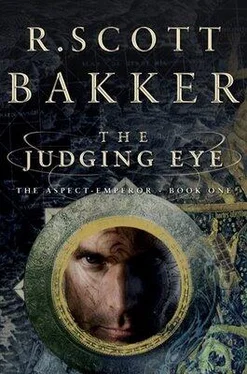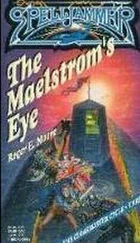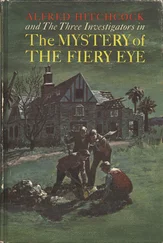R. Bakker - The Judging eye
Здесь есть возможность читать онлайн «R. Bakker - The Judging eye» весь текст электронной книги совершенно бесплатно (целиком полную версию без сокращений). В некоторых случаях можно слушать аудио, скачать через торрент в формате fb2 и присутствует краткое содержание. Жанр: Фэнтези, на английском языке. Описание произведения, (предисловие) а так же отзывы посетителей доступны на портале библиотеки ЛибКат.
- Название:The Judging eye
- Автор:
- Жанр:
- Год:неизвестен
- ISBN:нет данных
- Рейтинг книги:5 / 5. Голосов: 1
-
Избранное:Добавить в избранное
- Отзывы:
-
Ваша оценка:
- 100
- 1
- 2
- 3
- 4
- 5
The Judging eye: краткое содержание, описание и аннотация
Предлагаем к чтению аннотацию, описание, краткое содержание или предисловие (зависит от того, что написал сам автор книги «The Judging eye»). Если вы не нашли необходимую информацию о книге — напишите в комментариях, мы постараемся отыскать её.
The Judging eye — читать онлайн бесплатно полную книгу (весь текст) целиком
Ниже представлен текст книги, разбитый по страницам. Система сохранения места последней прочитанной страницы, позволяет с удобством читать онлайн бесплатно книгу «The Judging eye», без необходимости каждый раз заново искать на чём Вы остановились. Поставьте закладку, и сможете в любой момент перейти на страницу, на которой закончили чтение.
Интервал:
Закладка:
"So you're Ainoni, then?"
"Small wonder the Captain's smitten…"
"Maybe he'll stop undressing us with his cursed eyes!"
The laughter was genuine enough to make Mimara smile, but utterly unlike the raucous mirth that was their norm. Soldiers, Achamian had observed, often wore thin skins in the presence of women they could neither buy nor brutalize. A light and careless manner, a gentle concern for the small things, stretched across a sorrow and an anger that no woman could fathom. And these men were more than soldiers, more than scalpers, even. They were Skin Eaters. They were men who led lives of uncompromising viciousness and savagery. Men who could effortlessly forget the dead rapist that had been their bosom friend.
And they would try to woo what they could not take.
"It's as I thought," Soma said as Achamian joined them. His look was amiable enough but with an edge that advised no contradictions. "She's one of the Bitten as well!"
The smell of contrivance hung about all their looks. They had planned this, Achamian realized, as a way of luring the prize to their fire. The question was one of how far the covenant went.
"The Ochain Passes are closed," he said. "Blizzard."
He watched their faces struggle to find the appropriate expressions.
There was comedy in all sudden reversals, a kind of immaterial nudity, to find your designs hanging, stripped of the logic that had been their fundament. Their carnal plots depended on the expedition, and the expedition depended on the Passes.
"The decision has been made," he said, trying hard not to sound satisfied.
"We brave the Black Halls of Cil-Aujas."
CHAPTER NINE
A beggar's mistake harms no one but the beggar.
A king's mistake, however, harms everyone but the king.
Too often, the measure of power lies not in the number who obey your will, but in the number who suffer your stupidity.
— Triamis I, Journals and DialoguesEarly Spring, 19 New Imperial Year (4132 Year-of-the-Tusk), Momemn
Her face seemed numb for tingling.
"Does he hear us, Mommy? Does he know?"
Esmenet clutched Kelmomas's little hand so tight she feared she might hurt him. "Yes," she heard herself say. The stone of the Ashery snared her words, held them close and warm, as though she spoke into a lover's neck. "Yes. He's the son of an earthly god."
According to Nansur custom, the mother of a dead male child had to mark her face with her son's ashes each full moon after the cremation: two lines, one down each cheek. Thraxami, they were called, tears-of-the-pyre. Only when her tears no longer darkened them could the rite cease. Only when the weeping ended.
Even now, she could feel his residue across her cheeks, burning, accusing, as though transmuted, Samarmas had become antithetical to his mother, a kind of poison that her skin could not abide.
As though he had become wholly his father's.
The tradition was too old, too venerated, to be contradicted. Esmenet had seen engravings of women marked with thraxami dating back to the early days of ancient Cenei, trains of them marching like captives. And in the ritual dramas the temples put on during Cultic festivals, mummers used black lines down a white-painted face to represent desolate women the way they used red horizontal lines, wurrami, to depict rage-maddened men. For the Nansur, thraxami were synonymous with mourning.
But where others kept their child's remains in their household shrine, little Samarmas, as a Prince-Imperial, had been interred in the High Royal Ashery of the Temple Xothei. So once again, what was tender and private for others became rank spectacle for her. Thousands had mobbed the gates of the Imperial Precincts, and thousands more the foundations of mighty Xothei, a seething carnival of mourning and anticipation, mothers casting dust skyward and rending their hair, slaves loafing and gawking, boys jumping to snatch glimpses over grown shoulders, and many more. Even here, deep in the temple's mazed bowel, she thought she could hear their anxious hum.
What would they say when they saw that her cheeks were dry? What would they make of an Empress who could not weep for the loss of her dearest child?
Illuminated only by the rare lamp, the walls of the Ashery seemed to hang in a greater black. Each of the niches spoke to the sensibilities of different ages and families. Some were garish with gilding and ornament, while others, like the adjacent niches of Ikurei Xerius and his nephew Ikurei Conphas, were simply chiselled into the raw stone, bereft of the marble facing that graced so many of the others. She tried not to ponder the irony of her son resting so close to Conphas, who had been the Nansurium's last Emperor before the ascension of Kellhus. She likewise ignored the guttered votives and small bowl of grain that had been left on the sill of his niche.
Someday, she thought, all her children would rest in this immobile gloom. Static. Speechless. Someday, she would reside here, cool dust encased in silver, gold, or perhaps Zeьmi jade-something cold, for all the substances that Men coveted were cold. Someday the heat of her would leach into the world, and she would be as dirt to the warm fingers of the living.
Someday she would be dead.
The relief that accompanied the thought was so sudden, so violent, that she almost audibly gasped. A confusion descended upon her, robbing her of memory and volition. She swayed, raised a hand to her blinking eyes. Then she found herself on the floor, sitting in a way that would have horrified her vestiaries it was so common, so undignified-no better than a whore hanging her legs from a window. She saw Kelmomas watching her, tried to smile reassurance. She leaned her head against the unyielding marble, the image of him lingering in her soul's eye. Small. Defenceless. The very image of his dead twin.
She heard his voice.
"Mommy? Does he hear us?"
She simply could not stop seeing him, Samarmas, his blood clotting the grass, his body as small as a dog, slowly relaxing about the spear that pierced it, slowly drifting asleep. Every time she blinked.
Every time she looked upon this other son.
"I told you…"
"No… I mean when we think." He was crying now, a desperate kind of hitching that made him bare his teeth. "D-does Sammy hear us when we think?"
She opened her knees and he fell into her arms, burned her neck with a muffled wail. And she saw-with grievous clarity, it seemed-that Samarmas's death had sundered her soul in two, the one part numb and wondering, the other clinging to this child, this replica, as though trying to absorb his shudders.
How could she protect him? And if she could not, how could she love?
She laid her head across his scalp, blew at the hairs that stuck to the seal of her lips. Her cheeks were wet, but whether the tears were her own she could not tell. No matter. The mob would be appeased. Her Exalt-Ministers would be relieved, for the Yatwerian matter had become far more than a Cultic nuisance. Who would raise voice or hand against a bereaved mother? And Kellhus…
She was so tired. So weary.
"The dead hear everything, Kel."
Iothiah…
A life lived, now forgotten.
And in its place…
A breeze as dry as hot ash. An airy room, clean with tile and paint, the floor canted to drain storm-waters. A woman in a simple linen shift, wedding young, her hair raven-dark, suckling an infant, smiling, asking something sweet and curious. Her head tipped, almond eyes flashing, poised to laugh at something soon to be said, a warm and gentle wit.
Peach-coloured walls trimmed in vining green.
A life forgotten…
Concern clouding her dark eyes. A quick glance at the infant against her breast, then again the question.
Читать дальшеИнтервал:
Закладка:
Похожие книги на «The Judging eye»
Представляем Вашему вниманию похожие книги на «The Judging eye» списком для выбора. Мы отобрали схожую по названию и смыслу литературу в надежде предоставить читателям больше вариантов отыскать новые, интересные, ещё непрочитанные произведения.
Обсуждение, отзывы о книге «The Judging eye» и просто собственные мнения читателей. Оставьте ваши комментарии, напишите, что Вы думаете о произведении, его смысле или главных героях. Укажите что конкретно понравилось, а что нет, и почему Вы так считаете.












